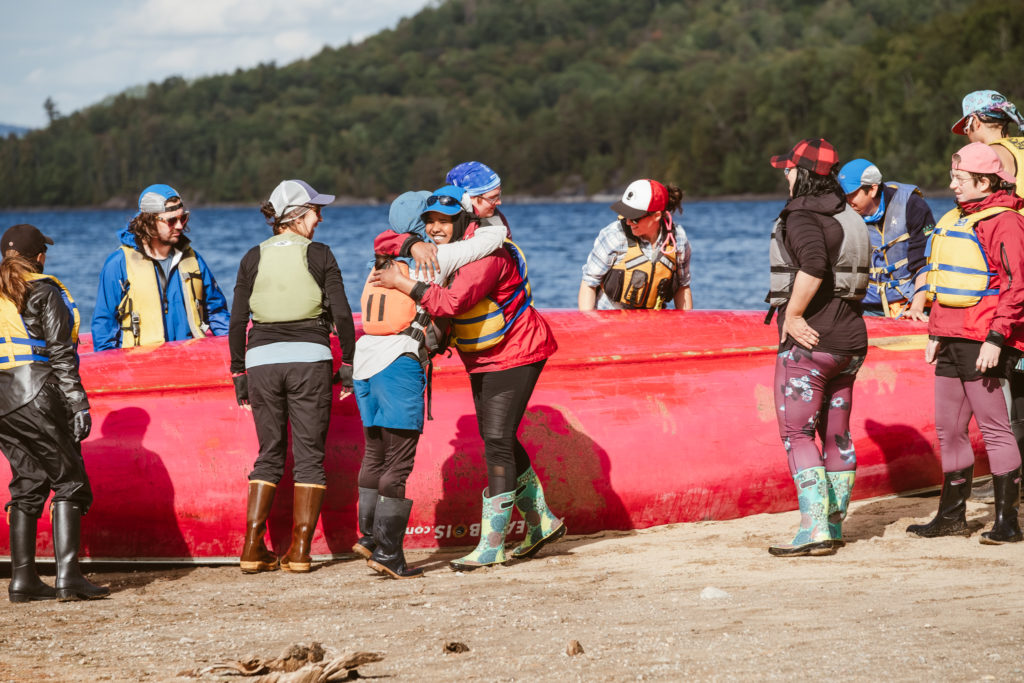
Dr. Linda Paquette is an inspired and passionate woman. Psychologist and professor in social and community psychology at the University of Quebec at Chicoutimi (UQAC), she has built a career that is rich in experiences and focused on youth. Inspired by her teacher, Mario Bilodeau, and charmed by the On the Tip of the Toes Foundation, Linda Paquette joined the Foundation team to conduct a study on the benefits of outdoor adventure for young people living with cancer.
Linda Paquette’s academic record is impressive: after obtaining her B.A. and M.A. at UQAC, the ambitious young student completed a training period in psychiatry before diving into her PhD. During that time she focused on troubled teens and the emotional regulation mechanisms related to sports, risk taking and the use of psychotropic drugs. Her field of study also led her to focus on the mechanisms of socialization in adolescents.
After two years working with clients in Montreal’s youth centers, Linda Paquette returned home to continue her research and to teach at UQAC. This was the beginning of her collaboration with the On the Tip of the Toes Foundation; from 2011 to 2015 she conducted a study which focused on young people taking part in the Foundation’s adventures.
Supported by Mario Bilodeau – nature enthusiast, vice-president and co-founder of the foundation – her study measured the benefits of outdoor expeditions for young people living with cancer. Her hypothesis was that adventure and immersion in nature increases self-esteem, reduces psychological distress and facilitates the creation of strong and meaningful social bonds.
Her hypothesis was confirmed! After four years of analysis and observations of the young participants, the data showed that these therapeutic experiences have, in fact, very positive impacts on young people. Further, these effects continue over time and have a positive effect on the construction of their identity.
In surveys taken before and after the expeditions, the young participants express deep gratitude and happiness for having had the chance to take part in these journeys of excitement and wonder. For many of them, these experiences in the wild are new and the discovery is revealing. The peace that they find in the forest and the open spaces has a beneficial healing effect and many of them mention the unforgettable nature of these adventures and the precious memories that they will treasure.
As Linda Paquette reminds us, the fact of meeting new challenges as a group gives rise to valuable connections as the participants find themselves with others that share similar realities, doubts and questions. This proximity creates strong bonds and helps to break the isolation often felt by young people who have been cut off from their social group and their normal living environment.
Moreover, it is an opportunity for them to free themselves from the family cocoon and to define themselves without reference to their illness. The study conducted by Linda Paquette shows that these expeditions are conducive to personal development and that they generate autonomy and trust among young people. After having spent a long time feeling weak and helpless in the face of their disease, this revival of power over their bodies is very precious.
With a smile in her voice, Linda Paquette tells the story of a girl who wanted to bring her wig on an expedition, feeling reluctant to part with it. Encouraged by the foundation team, she decided to leave it in her luggage on the third day of the trip. This gesture might seem trivial, but for her it was a great act of courage and an important recovery of power. Importantly, it was the first step towards a complete acceptance of her situation. Back at home, the wig remained in the drawer. The confidence she had gained during the adventure freed her from much of her insecurity.
For Dr. Linda Paquette, the connection with the On the Tip of the Toes Foundation was love at first sight and the Foundation’s mission was a logical follow-up to her studies. A nature-based approach and going beyond one’s limits was above all an opportunity to get young people out of hospitals and to immerse them in a calm and soothing environment. According to Paquette, a teenager is much more than a disease, a treatment protocol or a medical follow-up and for this reason the mission of the Foundation is particularly dear to her. She believes that these wilderness adventures are incredibly important in the healing process of young people, that nature is an immense gift to offer to a young person who has struggled with the torturous paths of the disease, a gift that opens the door to confidence and freedom.
Photo: Catherine Tétreault